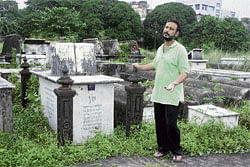Slowly fading into history
With the creation of Israel in 1948, a majority of Jews left Kolkata and later the youngsters from the community branched out to other countries, leaving the elderly behind

As Shalom Israel, one of the last Jews of Kolkata, squeezes past tea stalls, casually ignores the idle rickshaws and honking cars of the city, he is well aware that his every moving step is leading him and his community into oblivion. With the population shrinking at an alarming rate, 27 Jews living in this city know the inevitable truth--that it might take another 10 years or so when once a robust society with a population of nearly 5,000, will be just part of the City of Joy's history.
“We are a dying community. We know that. We have another 10 years or may be a little more. There is not too much left for us,” 66-year-old Ian Zachariah, a burly former advertisment man who worked in the Calcutta office of J Walter Thompson, told Deccan Herald.
Jews first came to India as traders some 250 years ago, and today their largest community is in Mumbai, the country’s financial capital. Kolkata’s first Jews are thought to have come in the late 18th century and descendants of the Baghdad Jews came from Syria, Iran and Iraq. According to Jewish history, the community began optimistically with the arrival of Shalom Cohen’s from Aleppo, Syria. After that they thrived as diamond traders, real estate dealers, exporters, spice wholesalers and bakers.
One Jewish bakery--Nahoum & Son’s Bakery-- which still stands at New Market in central Kolkata is not only famous for its plum cakes but also as the embarkation point for making contact with the city’s Jewish community. Of late, octogenarian David
Nahoum, the owner of the bakery, is not keeping good health and has stopped selling plum cakes. He only greets visitors.
This is the case with most of the members of the community. Aline Cohen, 62, who was born after the community’s heydays, still remembers festivals and packed synagogues.
“Now, there aren’t enough able-bodied men to form a minyan--the quorum necessary for services, and no one but Israel regularly visits the temples. The Jews rarely get together except at funerals, and sometimes not even then,” she said.
With the average age of the members of the community hovering around 75, Zachariah, the descendant of Shalom Cohen, said: “Sometimes we feel really lonely. We all have non-Jewish friends, but there is kind of spiritual loneliness. You miss Sabbath services.
You miss the feeling of community. You feel yourself enisled in the sea of life.”
The Jewish community built at least three synagogues--Neve Shalom, Beth El and Magen David--and two schools Elias Meyer Free School and Talmud Torah. Today, there are 700 students at the schools but not one is Jewish, and nothing particularly Jewish is taught there.
Sadly, the once regularly used synagogues are now open to the occasional tourists, many of whom are the descendents of Jewish families of Kolkata now settled in Israel, Britain, Australia and Canada.
In the 1930s and 40s, Kolkata, the then Calcutta, was a bustling and raucous hub and Jews formed a solid minority, their wedding parties and religious feasts flowing down the temple steps. Jews were players at the popular horse track. Israel, youngest member of the community, still remembers his father’s race horses--Onslaught, War Dance and Black Toy. They were regulars at the fashionable restaurants.
When asked what made the Jews move away from Kolkata, Zachariah said: “The creation of Israel in 1948 saw a majority of Jews leave the city. Gradually, the young branched out to other countries for better prospects, leaving the elderly behind”.
When asked whether they ever felt any kind threat to the community, Zachariah said: “We have faced no discrimination. We were too small to bully. There were so many other people to beat up -- Hindus vs Muslims, high caste vs lower caste. Who’s going to pick on us?” “No one knew who we were,” he added.
At present the situation is such that repopulating the community would be tough as for the unmarried men, there are no single Jewish woman. Among the few who remain include an equal number of men and women.
“I don’t know any woman who is below 60 and so there is no question of marriage. The last Jewish wedding as far as I can remember was in 1982,” Israel, whose sister was shunned out of society because she married a Hindu, said.
Israel comes to a synagogue every Friday to light a candle, say a prayer and check on the three synagogues still standing, however precariously, as relics of a passed era of plenty. When asked why he is not going to Israel when he has the opportunity, Israel, who has made a mission to serve this aged dwindling community, said: “Sure, I could go to Israel. Probably I could find a job there, may be on a kibbutz. But why should I go?
What can I contribute there? Here the community needs me.”
“It’s only a matter of time before people die or leave. There is no future. The inevitable, I can’t fight but definitely I can serve and this is what I am trying to do,” Israel, who reaches out to the aging community whenever needed, said.
The superintendent of the lone Jewish cemetery at North Kolkata said: “Sooner than later, there will be no one left to tend to the cemetery after me”. Can he see himself living in Kolkata as its last Jew? “Yes,” he said with a shrug.
Deccan Herald is on WhatsApp Channels| Join now for Breaking News & Editor's Picks